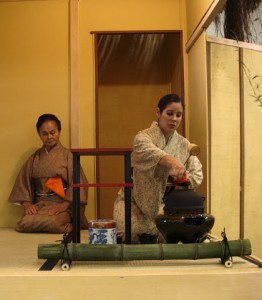Tea: it’s comforting. It’s often caffeinated. It’s delectable during these fall Iowa days. Of course, as Professor Zelideth Rivas of the Chinese and Japanese Department knows, that’s only the beginning of what tea has to offer. Rivas, a tea connoisseur, has studied the Japanese tea ceremony for 17 years.

“[The preparation of tea is] a way of thinking about what we consume and how we are in the room together,” she said. “It’s learning how to read each other and how to converse. It’s about being there in the moment and learning about a different culture.”
Rivas has presented Japanese tea ceremonies in locales such as Brazil, Japan and various American cities, and on Monday, Nov. 14, at 4:15 p.m. in JRC 101, Rivas will bring an Urasenke style tea ceremony to Grinnell College. Rivas will prepare a shohaku thin tea by whisking matcha, a powder derived from ground tea leaves, in hot water.
“I’m going to be talking about creating peace through this one bowl of tea and how it is we do that,” Rivas said.
Rivas will address tea etiquette, which often involves reflection and discussion of certain poems or “tea scrolls.” She described the process of tea preparation as a moving mediation.
“One of my favorite teachings in tea is [a] scroll that says: Just sit, drink tea,” Rivas explained. “[Tea is] a way of moving past our everyday and rooting ourselves in the moment, and that moment is tea. Nothing else matters but the tea.”
After opening with a discussion on tea etiquette, Rivas will select audience members to act as guests in her tea room and will prepare the shohaku tea for them by using the basic beginner’s procedure. Before drinking the tea, Rivas’ guests will be offered sweets to prepare their palates for matcha. High in caffeine, matcha was favored by Japanese monks in the ninth century when Japan first began importing Chinese tea; now, matcha is integral to the tea ceremony. According to Riva, sweets complement the bitter matcha.
“[Sweets allow guests to] taste the sensibilities of tea on [their] tongue. … [Every blend has a] different flavor depending on where the plant was blooming, or when they picked it, or the time, or who put this blend together,” Rivas said. “They’re all a little bit different.”
Following Rivas’ tea ceremony, all attendees will have the opportunity to whisk their own tea with a bamboo whisk. At this time, everyone will have the chance to sample tea.
“Those who whisk their own tea can drink it, or whisk it for someone else and offer it,” Rivas said.
In presenting a Japanese tea ceremony, Rivas hopes to share her love of tea with her fellow Grinnellians.
“If there’s any lesson we can take out of tea,” Rivas said, “it is to just sit and enjoy it.”

















































